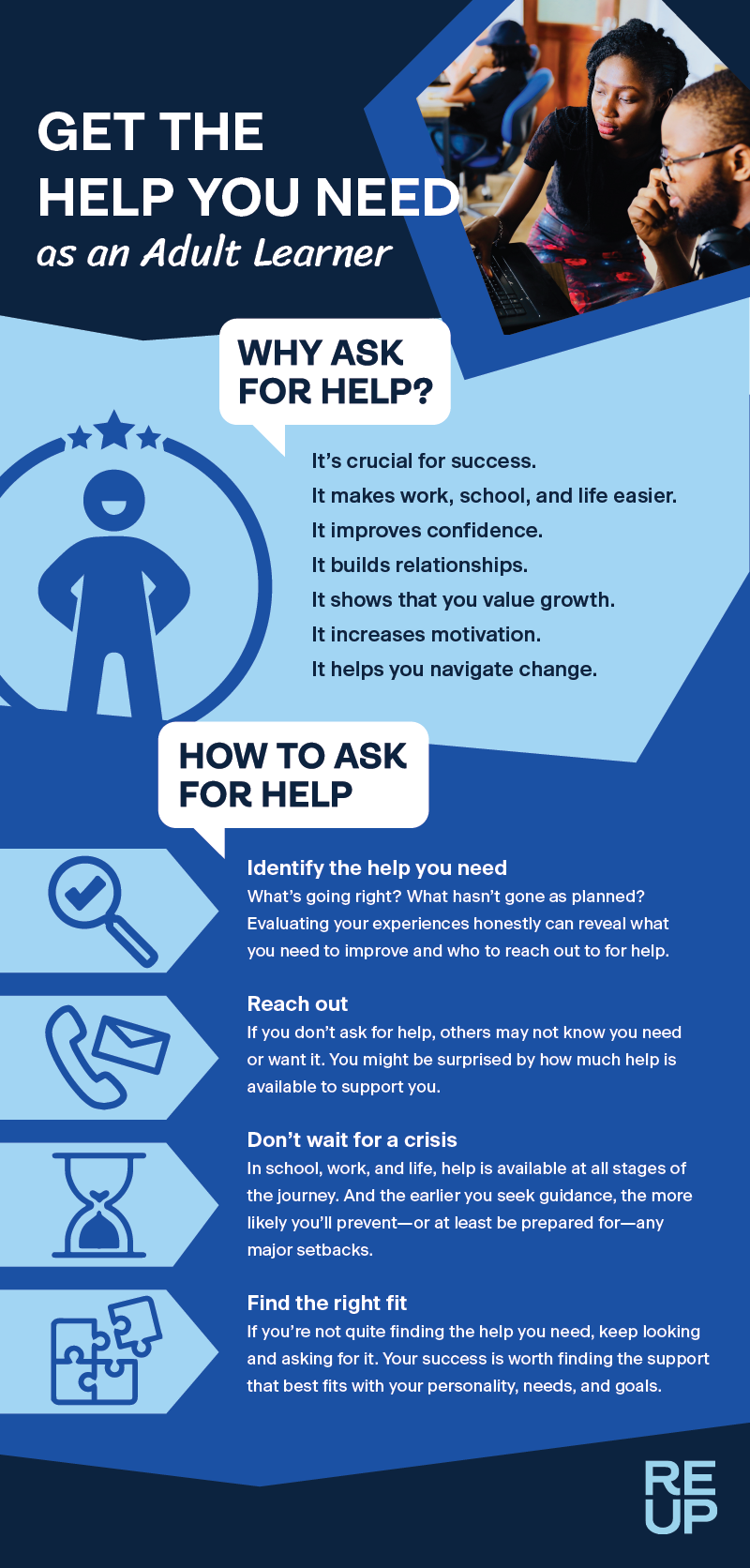Why’s it so hard to ask for help?
Asking for help can be difficult. It can feel like we’re admitting defeat or personal failure. It can be hard because self-reliance is ingrained in our culture. For example, the American myth of “pulling oneself up by one’s bootstraps” is certainly pervasive—even though the idiom originated in the 19th century as a snide description of an absurdly impossible task. And some of us come from families in which asking for help was frowned on because of our gender or was even punished as a means of “building character.”
Going it alone is OK sometimes, but it’s also a much rougher road—and one that often leads to stress, resentment, and burnout.
World-renowned athletes win medals in part because of training by their coaches. Best-selling authors and internationally respected scholars credit their editors and reviewers for improving their work. Business executives need support from consultants and leadership coaches to climb the corporate ladder.
Just like the pros we admire, every individual deserves guidance and help. And try not to think of it as imposing on others. Coaches, faculty, tutors, campus support staff, and counselors are all professionals whose job is to provide assistance so we can succeed. In fact, as a former tutor, professor, and academic advisor, I can tell you that one of the best parts of those jobs is getting to help students chat about their challenges, offer guidance, and achieve their goals. So just know that it is incredibly rewarding when you give someone the opportunity to help you.
Now you have an idea of why to ask for help, but how do you do it? Let’s break it down.
Know thyself
Reflect on your strengths and weaknesses: When you think back on your education so far, what went right? What didn’t go as planned? Examining your experiences honestly can help you determine what you want to improve. Maybe you need better strategies for learning the material. Perhaps maintaining motivation is the issue. Or maybe procrastination is keeping you back, so you need to work on time management. Determining what kind of guidance you need can help you sort out who you need to reach out to for help.
SMS as SOS
This is perhaps the most crucial step: You have to do the work of asking for help because others are unlikely to know that you need it. So if you have questions, are experiencing self-doubt, or are outright struggling, advocate for yourself! Talk to classmates. Connect with a coach who can help orient you to services on and off campus. Ask your campus librarians questions via text or email. Show up at your professor’s office hours (I promise that they won’t bite!). Make an appointment at counseling or career services. Inquire how to schedule a peer-tutoring session at your school’s academic support center.
When I got to college, for example, I experienced doubts about whether my work was up to snuff. A friend and classmate a couple years ahead of me suggested the campus writing center. Until I asked for his advice, I had no idea that the writing center even existed. I also didn’t know that it would be staffed by fellow students who would be happy to read my essays and provide me with feedback on how to improve. It was such a relief to have that resource, but I had to let someone know about my concerns first to know there was help available.
 Get help whenever you need it
Get help whenever you need it
Help is available at all steps of your education journey, not just when you’re in panic mode. You can seek guidance while you’re getting started, as you’re learning the ropes, in the middle of projects and assignments, when you’re experiencing self-doubts or develop questions, and after you’ve had setbacks.
That said, the earlier you seek assistance, the better. Think of it like preventative medicine: if you visit your physician for regular check-ups, you can learn how to develop healthy habits and detect warning signs before they become major issues.
Similarly, tutoring is available when you’re in the midst of learning a subject; it’s not intended solely for learners after they’ve failed an assignment or exam. And counseling is available if you need strategies for preventing stress and burnout, not just when you’re in the midst of a mental-health crisis.
Find the right fit
So you’ve asked for help, but you’re not quite finding the support you need. What now?
Keep looking and asking for help.
Sometimes, you just don’t quite click with a coach, or maybe the kind of guidance you need isn’t what a counselor specializes in. That’s OK; don’t give up! It can take work to find the right fit, but your success is worth finding the support that best aligns with your personality, needs, and goals.
Asking for and even receiving help can sometimes make us feel vulnerable. But remember that that discomfort is a sign of growth and strength! To grow, we have to leave our comfort zone to try new things, figure out what works (and doesn’t work!), and put the things we’ve learned, such as go-to resources and useful life strategies, into regular practice. Many of us have found that asking for and accepting help can be huge boosts to both motivation and self-confidence.
Remember: you don’t have to take on difficult journeys alone. Self-advocacy is all about being proactive, and it’s a crucial part of success, both in school and in life.
Ready to ask for help?
ReUp success coaching provides you with a safe, nonjudgmental space for you to ask questions, explore your concerns, and discover the resources that will help you maximize your potential. Your support team is available by phone, text, or email. Ready to take the next step in your education journey?






